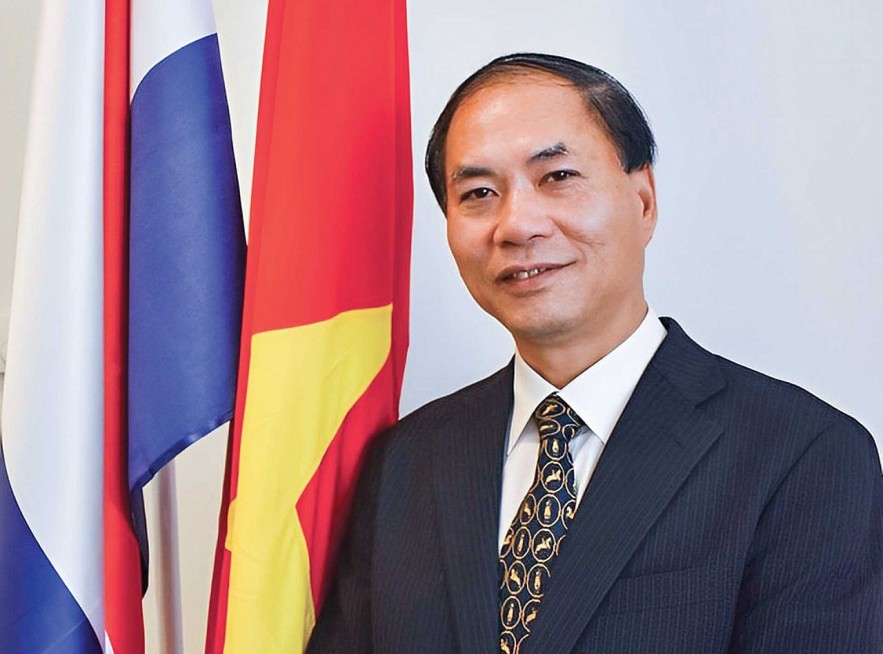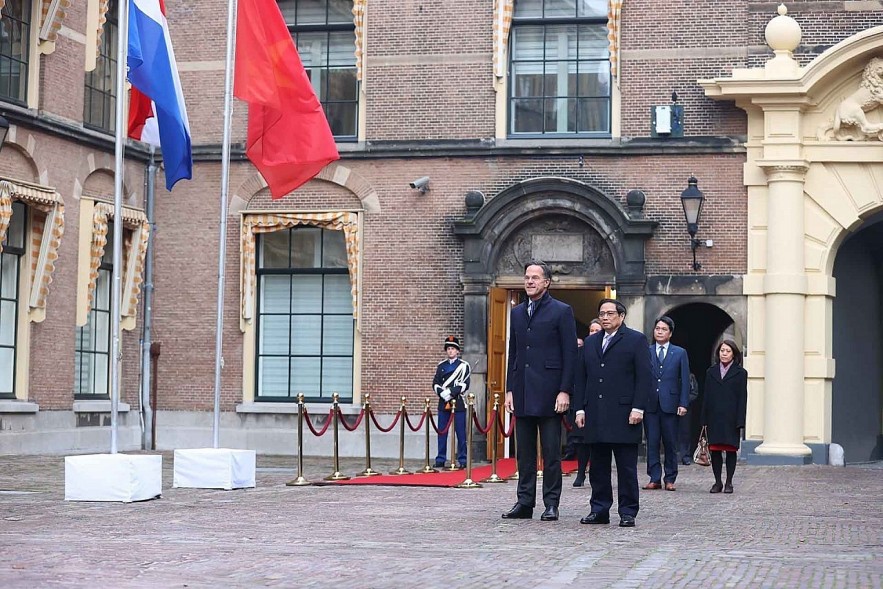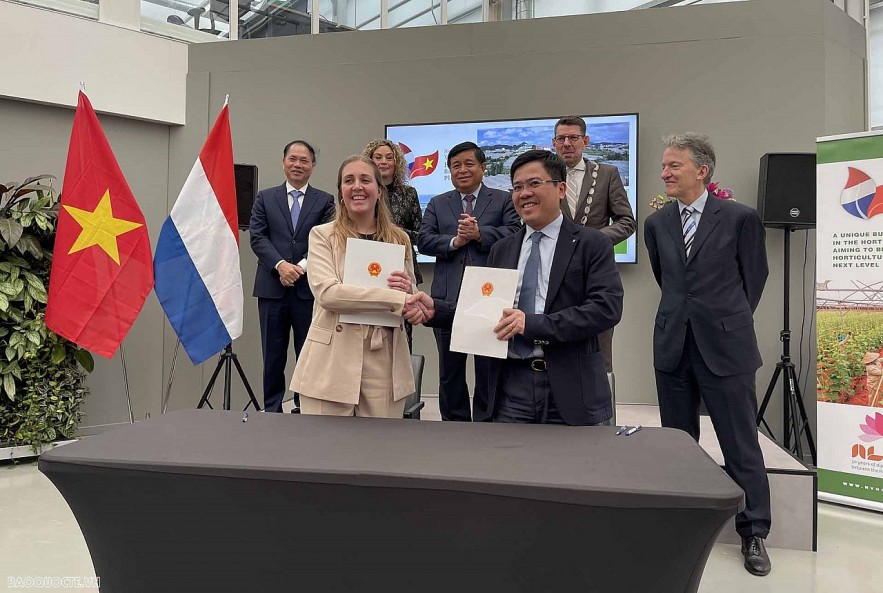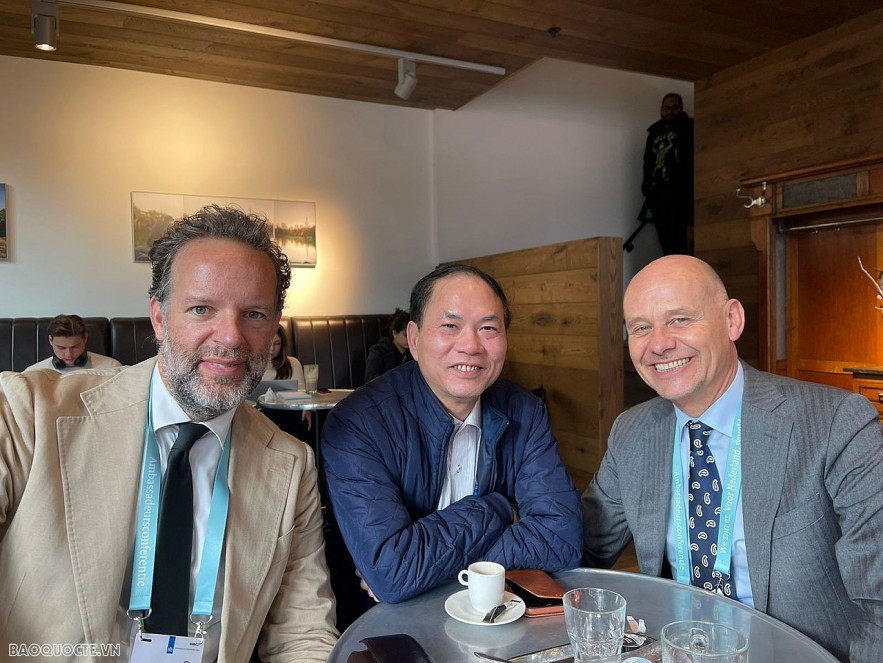 |
| Vietnamese Ambassador to the Netherlands Pham Viet Anh. (Photo: Vietnamese Embassy in the Netherlands) |
On the 50th anniversary of the establishment of diplomatic relations between Vietnam and the Netherlands (April 9, 1973 – April 9, 2023), Ambassador of Vietnam to the Netherlands Pham Viet Anh expressed his joy over the successful bilateral ties between the two countries over the past half century and highlighted the potential for even further cooperation in the future.
The Vietnam-Netherlands relationship has flourished in the past 50 years. Both countries have established strong diplomatic ties, with trade and investment flourishing in recent years. To evaluate the success of this cooperation, one must consider the economic, political, and social impact it has had. Economically, the two countries have benefited immensely, with the Netherlands becoming one of the major investors in Vietnam. Politically, the relationship has grown steadily, with the Netherlands now recognized as a reliable partner in the region. Socially, the two countries have benefitted from the exchange of culture, knowledge, and traditions. All in all, the Vietnam-Netherlands cooperation in the past 50 years can be deemed a success, with both countries reaping the benefits of their bilateral relationship.
In 2023, the diplomatic relationship between Vietnam and the Netherlands passed a remarkable journey spanning 50 years, marked by impressive milestones and successes for both countries. We can confidently state that this is a model of a healthy, open, honest, and effective relationship between Vietnam and a European nation.
The relationship between the two countries has taken a significant turn to a newer and more prosperous stage. In the past, Vietnam faced many adversities due to the war and its aftermath. The Netherlands steadfastly assisted Vietnam in many aspects, even before setting up formal diplomatic ties. The relationship during this period was mainly comprised of providing and receiving. Recently, as Vietnam has made tremendous progress, the relationship has evolved into one of equal cooperation, mutual effort, mutual benefit, and a win-win outcome.
&
The Vietnam-Netherlands relationship has been continuously strengthened over the years. Recognizing the common challenges posed by nature and climate change, as well as the strategic geopolitical significance of both nations, both sides saw a great opportunity for cooperation. With this in mind, the two countries have worked together to capitalize on their partnership, fostering collaboration in the areas of trade, culture, and investment. This has enabled them to create a strong and lasting relationship that serves both of their interests.
Recently, in April 2019, Dutch Prime Minister Mark Rutte visited Vietnam, resulting in an upgrade of the two countries’ relationship to a Comprehensive Partnership. This represents a step towards the Strategic Partnership that the two countries have been working towards in a number of areas, such as climate change adaptation, water management, sustainable agriculture, and food security.
From the goal of cooperation for the benefit of both countries, Vietnam and the Netherlands have come together to face the common challenges of humanity, working together towards a brighter future and safeguarding the earth.
At the end of 2022, on the occasion of Prime Minister Pham Minh Chinh’s official visit to the Netherlands, the two sides agreed to strengthen their cooperation in climate change adaptation, sustainable development, and energy transformation. This agreement will enable them to tackle global challenges such as the effects of climate change and the need for sustainable development and energy transformation. The two countries will work together to develop innovative solutions to these issues, as well as to promote economic growth and social progress. This partnership will help to ensure the long-term stability and prosperity of both countries.
This is especially true for Vietnam as there are many similarities between the two countries in terms of culture and history.
For Vietnam, collaborating and joining forces with the Netherlands offers an invaluable chance to seek advice and gain insight on how to consider problems, devise solutions, and execute them efficiently. This is even more noteworthy for Vietnam, given that the two countries share many commonalities in terms of culture and history.
Through 50 years of cooperation, Vietnam has gained invaluable insight from the Netherlands in the fields of economic liberalization, integration, and finding solutions to cope with climate change, green energy transition, and circular economy. By leveraging the knowledge exchange between the two countries, Vietnam has been able to make great strides towards a more sustainable future.
 |
| Dutch Prime Minister Mark Rutte welcomed Prime Minister Pham Minh Chinh on December 12, 2022. (Photo: VNA) |
With these accomplishments, what advantages and opportunities do the two countries possess to foster greater collaboration in the future?
The achievements of the two countries during 50 years of cooperation are the foundation for the development in the future.
The closeness and similarity in perception have led to measures to address current global challenges. This is a continuation of the similarities in the situation and thinking of the two countries in the past. Moreover, the harmony in the spirit of peace, justice, and respect for universal human values has prompted the Dutch people to actively support Vietnam’s resistance against the US in order to save the country.
If we look further into the past, this 50-year journey is shorter than the relationship between the peoples of the two countries, much shorter than the 400 years of trade relations. The Dutch East India Company ventured to Vietnam to purchase goods and materials, driven by the captivating Vietnamese and Southeast Asian cultures and products. Currently, the advantageous geographical location and mutual need for complementarity engender great potential for the relationship between the two nations.
Although the two countries have elevated their strategic partnership to new heights in certain fields, or even to a comprehensive partnership, the cooperation results have yet to meet the expectations of both sides.
The collaboration projects have seen promising initial outcomes in light of the new demands posed by global issues, climate change, and the necessity for sustainable development that all countries must partake in and work together on.
In the international arena, the two countries continue to maintain a tradition of mutual collaboration. Their political relationship has fostered a sense of trust, allowing them to exchange views on multilateral forums with confidence. As such, bilateral coordination and cooperation on multilateral forums tend to yield positive outcomes.
 |
| The Ministry of Planning and Investment and Netherlands-Vietnam Agro-Business Cooperation Association signed the MoU on empowering Vietnamese small and medium enterprises on February 22, 2023. (Photo: Vietnamese Embassy in the Netherlands) |
In order to further strengthen the bilateral relations between the two countries in the future, both countries should engage in open dialogue, cooperation, and mutual understanding. Additionally, there should be an exchange of cultural and economic ties, as well as a commitment to mutual development. Both sides should also work to strengthen their diplomatic ties and strive to develop effective strategies for addressing any issues that arise. Ultimately, both countries should work together to ensure that their bilateral relations continue to grow in the years ahead.
Therefore, in order to build trust, we must take the initiative to understand each other, to listen to each other, to respect each other, and to support each other.
In order to strengthen and deepen cooperation in any relationship, it is essential to cultivate trust. By fostering trust, we can open ourselves up to give wholeheartedly, sincerely, substantively, and effectively. To construct this trust, it is important to take the initiative to comprehend one another, to listen attentively, to show respect, and to provide support.
The two countries have had a longstanding relationship of trust. To ensure that this trust is maintained and strengthened, it is necessary to regularly exchange ideas, opinions, and experiences at all levels – from the highest governmental offices to localities. Doing so will allow both sides to better empathize with each other, build trust, and cooperate more effectively.
To increase trust and efficiency, both sides must deepen their cooperation. This will enable them to work more closely together and build a stronger relationship. By doing so, they will be able to achieve greater productivity and mutual benefit. Additionally, this will create a more secure and reliable environment for both parties, thus enabling them to work at their best.
Economic cooperation between localities, organizations, and research institutions, resulting in specific outcomes that effectively serve the national development of each side, will be the foundation for advancing economic cooperation, building mutual trust, and achieving mutual benefits.
To foster greater collaboration, the two countries must work together to advance existing cooperation avenues and elevate their collaboration to a higher level.
The two countries must outline clear objectives, measures, a roadmap, and an implementation plan. Establishing stages for inspection, supervision, review, and evaluation is also essential. This will ensure that the plan is carried out in an effective and efficient manner. Additionally, the plan should be regularly monitored and assessed to ensure its success.
Dutch businesses usually prefer to take on projects that have a clear goal and limited risk.
Due to its highly open economy, Dutch localities and businesses play a major role in directly producing goods and services. They enjoy a great degree of autonomy, independence and flexibility, and communication within the country is generally direct and precise. When seeking cooperation, it is essential to provide enough information and a well-defined plan to help visualize the expected results of the collaboration. Dutch businesses typically like to take on projects that have a distinct purpose and minimal risk.
 |
| Ambassador Pham Viet Anh (centre) and Dutch Ambassador to Vietnam Kees van Baar (right), Consul General of the Netherlands in Ho Chi Minh City Daniel Coenraad Stork met to discuss measures to promote bilateral relations on the 50th anniversary of diplomatic relations between the two countries. Photo: WVR |
Vietnamese localities and businesses must be aware of the advantages, orientations, and rigorous standards of the Dutch market in order to succeed. Knowing and understanding the Dutch market can help them maximize their potential and capitalize on any opportunities that arise. It is essential for Vietnamese localities and businesses to have an understanding of the Dutch market in order to remain competitive.
They must ready themselves with their strengths, potentials, needs, and orientations in order to create successful connections with Dutch partners in each locality, field, and industry. By doing so, both countries will benefit from the practical results of their cooperation.








